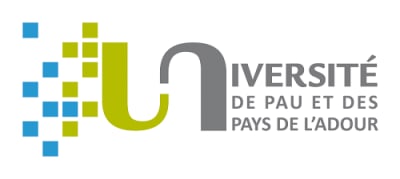A multidisciplinary university
The University of Pau and Pays de l’Adour (UPPA) is a multidisciplinary university which covers three major areas of study:
- Law, economics, business, management
- Science and technology
- literature, languages, arts, social sciences and humanities and sport
UPPA offers its students initial or continuing education, work/study programs or apprenticeships, to obtain Bachelor’s, Master’s and vocational degrees and Doctorates through its 3 Colleges and 2 Doctoral Schools.
The university also includes two IUTs (University Institute of Technology), one IAE (University School of Management), two engineering schools (ENSGTI, covering industrial technology engineering and ISA BTP covering construction), a continuing education department and an apprenticeship training center.
An ideal working environment
The teaching teams at UPPA prepare our 11,500 students to complete their course, but they are also attentive to the needs of students and are always available, and committed to our quality process.
Careers guidance and professional advice are also at the heart of each study program: student professional project, meetings with former students, job fairs, help with finding internships and jobs.
Scientific research at an international level
With 24 research units associated with research bodies such as the CNRS, INRA and INRIA, research at UPPA covers:
- 5 strategic themes:
- Environment and materials
- Geo-resources
- Aquatic environments and resources
- Justice and territories
- Areas, borders and blending
- and one transversal and multidisciplinary theme: energy, environmental and social transitions.
- Institut Carnot ISIFoR (Institute for the sustainable engineering of fossil resources).
- Equipex MARSSEquipex MARSS (Mass Spectrometry center for Reactivity and Speciation Sciences).
- Equipex in the XYLOFORESTXyloforest Programme network (development of the wood sector).
- Labex in the STORE-EX network (electrochemical storage of energy).
- LabCom, shared laboratory with URGO.
A university firmly rooted in its region
Since its foundation in 1970, UPPA has formed relationships with local institutional and industrial partners, making it a major player in the economic development of southern Aquitaine.
It has forged some very strong links with major contractors, such as Total, Turboméca, Arkema, Toyal, Messier-Dowty and it supports SME/SMI through a hundred collaboration agreements.
UPPA is also supported by local authorities and is part of ComUEA, the Community of Universities and Higher Education Establishments in Aquitaine. It is also a member of SATT Aquitaine (Aquitaine Sciences Transfer)
Energy and Environment, keywords for the I-SITE project run by UPPA
As part of the “Future Investments” program launched by the government, UPPA submitted a proposal for the I-SITE project (Initiatives – Science – Innovation – Territories – Economy) with The E2S – Energy Environment Solutions project. Pre-selected in June 2016, the project is based on a consortium with the INRA and lnria linked to the region’s strong private and public R&D potential.
The consortium will run this project on the energy and environmental transition, in synergy with companies (Total, Arkema, TIGF and Safran Helicopter Engines) and academic partners (CEA, the CNRS, the University of the Basque Country and the University of Saragossa). E2S is also supported by local governments: the Aquitaine-Limousin-Poitou-Charentes Région, the Pyrénées-Atlantiques and Landes Départements, the Pau Béarn Pyrénées Communauté d'agglomération, the Mont-de-Marsan Agglomération, and the Lacq-Orthez and Basque Communautés de communes.
E2S teams will meet challenges related to the energy transition, geo-resources, aquatic habitats and the environmental effects of natural and anthropogenic changes, in line with research and innovation developments by major industrial partners. The objective is to break down targeted scientific barriers (storage of CO2, production of biogas, new batteries, development of fully electric plane, etc.).
Specialists in Sciences, Humanities, Sociology, and Law will thus increase UPPA’s international attractiveness in cutting-edge fields with the world’s top institutions (Stanford, Berkeley, MIT, etc.) in particular through joint chairs; a still higher quality policy, postgraduate courses taught in English in the E2S field.
The project also involves changes in the university’s governance and organization, which will move towards a structure based on three major faculties, each including teaching, research, and innovation. Particular effort will be made regarding human resources to increase the number of academic researchers in E2S themes. Local industrial partnerships will complement the strengths of the consortium, giving significant leverage to research and innovation in these fields.









